- Home
- Elmore Leonard
Trail of the Apache and Other Stories Page 6
Trail of the Apache and Other Stories Read online
Page 6
the ground for a sign. That’s what he was paid for.
It kept running through his mind that it was an awful funny thing to go out after sixteen hostiles, meet
sixty and still come back with sixteen. Have to tell
that one at Lon Scorey’s in Globe.
Pillo rode with his chin on his bony chest. He
was much older, and the throbbing hole in his thigh
58
ELMORE LEONARD
didn’t help him, either. He was beginning to smell
the greenness of decay.
On the afternoon of the fourth day they rode
slowly into the quadrangle at Gila. Travisin looked
about. Nothing had changed. For a moment he had
expected to find something different, and he
yearned for something that wasn’t there. But he
threw aside his longing and slumped back into his
role—the role that forced him to be the best
Apache campaigner in the Territory.
A cavalry mount stood in front of the agency office and a trooper appeared on the porch as Travisin, Fry and de Both dismounted and walked to the
welcome shade of the ramada.
“Compliments of the commanding officer, sir.
I’ve rode from Fort Thomas with this message.”
Travisin read the note and turned with a smile to
the other two. “Bill, let me tell you one thing if you
don’t already know it. Never try to figure out the
ways of a woman—or the army. This is from Collier. He says the Bureau has decided to return Pillo
and his band to his people at Fort Apache. All sixteen of ’em. Certainly is a good thing we’ve got sixteen to send back.”
Fry said, “Yep, you might have got yourself
court-martialed. Way it is, if Pillo loses that leg,
you’ll probably end up back as a looie.”
De Both listened and the quizzical look turned to
anger. He opened his mouth to speak, but thought
Trail of the Apache
59
better of it and waited until he had cooled off before muttering simply, “Idiots!”
If Travisin was the winking type, he would have
looked at Fry and done so. He glanced at Fry with
the hint of a smile, but with eyes that said, “Barney, I think we’ve got ourselves a lieutenant.” Then
he walked into the office. There are idiotic Bureau
decisions, and there are boots that have been on
too long.
And along the Gila, the war drums are silent
again. But on frontier station, you don’t relax. For
though they are less in number, they are still
Apaches.
2
You Never See Apaches . . .
By nature, Angsman was a cautious man. From
the shapeless specks that floated in the sky miles
out over the plain, his gaze dropped slowly to the
sand a few feet from his chin, then rose again more
slowly, to follow the gradual slope that fell away
before him. He rolled his body slightly from its
prone position to reach the field glasses at his side,
while his eyes continued to crawl out into the
white-hot nothingness of the flats. Sun glare met alkali dust and danced before the slits of his eyes.
And, far out, something moved. Something darker
You Never See Apaches . . .
61
than the monotonous tone of the flats. A pinpoint
of motion.
He put the glasses to his eyes and the glare
stopped dancing and the small blur of motion
cleared and enlarged as he corrected the focus.
Two ponies and two pack animals. The mules were
loaded high. He made that out right away, but it
was minutes before he realized the riders were
women. Two Indian women. Behind them the
scavenger birds floated above the scattered animal
carcasses, circling lower as the human figures
moved away.
Angsman pushed himself up from the sand and
made his way back through the pines that closed in
on the promontory. A few dozen yards of the darkness of the pines and then abruptly the glare was
forcing against sand again where the openness of
the trail followed the shoulder of the hill. He
stopped at the edge of the trees, took his hat off,
and rubbed the red line where the sweatband had
stuck. His mustache drooped untrimmed toward
dark, tight cheeks, giving his face a look of sadness.
A stern, sun-scarred sadness. It was the type of face
that needed the soft shadow of a hat brim to make
it look complete. Shadows to soften the gaunt angles. It was an intelligent, impassive face, in its late
thirties. He looked at the three men by the horses
and then moved toward them.
62
ELMORE LEONARD
Ygenio Baca sat cross-legged in the dust smoking
a cigarette, drawing deep, and he only glanced at
Angsman as he approached. He drew long on his
cigarette, then held it close to his eyes and examined it as some rare object as the smoke curled
from his mouth. Ygenio Baca, the mozo, had few
concerns.
Ed Hyde’s stocky frame was almost beneath his
horse’s head, with a hand lifted to the horse’s muzzle. The horse’s nose moved gently against the big
palm, licking the salty perspiration from hand and
wrist. In the other arm Hyde cradled a Sharps rifle.
His squinting features were obscure beneath the hat
tilted close to his eyes. Sun, wind, and a week’s
beard gave his face a puffy, raw appearance that
was wild, but at the same time soft and hazy. There
was about him a look of sluggishness that contrasted with the leanness of Angsman.
Billy Guay stood indolently with his thumbs
hooked in his gun belts. He took a few steps in
Angsman’s direction and pushed his hat to the back
of his head, though the sun was beating full in his
face. He was half Ed Hyde’s age, a few years or so
out of his teens, but there was a hardness about the
eyes that contrasted with his soft features. Features
that were all the more youthful, and even feminine,
because of the long blond hair that covered the
tops of his ears and hung unkempt over his shirt
collar. Watching Angsman, his mouth was tight as
You Never See Apaches . . .
63
if daring him to say something that he would not
agree with.
Angsman walked past him to Ed Hyde. He was
about to say something, but stopped when Billy
Guay turned and grabbed his arm.
“The dust cloud was buffalo like I said, wasn’t
it?” Billy Guay asked, but there was more statement of fact than question in his loud voice.
Angsman’s serious face turned to the boy, but
looked back to Ed Hyde when he said, “There’re
two Indian women out there cleaning up after a
hunting party. The dust cloud was the warriors going home. I suspect they’re the last ones. Stragglers.
Everyone else out of sight already.”
Billy Guay pushed in close to the two men.
“Dammit, the cloud could have still been buffalo,”
he said. “Who says you know so damn much!”
Ed Hyde looked from one to the other like an
unbiased spectator. He drop
ped the long buffalo rifle stock down in front of him. His worn black
serge coat strained tight at the armpits as he lifted
his hands to pat his coat pockets. From the right
one he drew a half-chewed tobacco plug.
For a moment Angsman just stared at Billy Guay.
Finally he said, “Look, boy, for a good many years
it’s been my business to know so damn much.
Now, you’ll take my word that the dust cloud was
an Indian hunting party and act on it like I see fit,
or else we turn around and go back.”
64
ELMORE LEONARD
Ed Hyde’s grizzled head jerked up suddenly. He
said, “You’re dead right, Angsman. There ain’t
been buffalo this far south for ten years.” He
looked at the boy and spoke easier. “Take my word
for it, Billy.” He smiled. “If anybody knows it, I
do. Those Indians most likely ran down a deer
herd. But hell, deer, buffalo, what’s the difference?
We’re not out here for game. You just follow along
with what Angsman here says and we all go home
rich men. Take things slow, Billy, and you breathe
easier.”
“I just want to know why’s he got to give all the
orders,” Billy Guay said, and his voice was rising.
“It’s us that own the map, not him. Where’d he be
without us!”
Angsman’s voice was the same, unhurried, unexcited, when he said, “I’ll tell you. I’d still be back at
Bowie guiding for cavalry who ride with their eyes
open and know how to keep their mouths shut in
Apache country.” He didn’t wait for a reply, but
turned and walked toward the dun-colored mare.
“Ygenio,” he called to the Mexican still sitting
cross-legged on the ground, “hold the mules a good
fifty yards behind us and keep your eyes on me.”
✯ ✯ ✯
Eight days out of Willcox and the strain was be ginning to tell. It had been bad from the first day.
Now they were in the foothills of the Mogollons
You Never See Apaches . . .
65
and it was no better. Angsman had thought that as
soon as they climbed from the dust of the plains the
tension would ease and the boy would be easier to
handle, but Billy Guay continued to grumble with
his thumbs in his gun belts and disagree with everything that was said. And Ed Hyde continued to say
nothing unless turning back was mentioned.
Since early morning their trail had followed
this pine-covered crest that angled irregularly between the massive rock peaks to the south and
east and the white-gold plain to the west. Most of
the ways the trail had held to the shoulder, turning, twisting, and falling with the contour of the
hillcrest. And from the west the openness of the
plains continued to cling in glaring monotony.
Most of the time Angsman’s eyes scanned the
openness, and the small black specks continued to
crawl along in his vision.
The trail dipped abruptly into a dry creek basin
that slanted down from between rocky humps
looming close to the right. Angsman reined his
mount diagonally down the bank, then at the bottom kicked hard to send the mare into a fast start
up the opposite bank. The gravel loosened and fell
away as hooves dug through the dry crust to clink
against the sandy rock. Momentarily the horse began to fall back, but Angsman spurred again and
grunted something close to her ear to make the
mare heave and kick up over the bank.
66
ELMORE LEONARD
He rode on a few yards before turning to wait
for the others.
Billy Guay reached the creek bank and yelled
across, without hesitating, “Hey, Angsman, you
tryin’ to pick the roughest damn trail you can
find?”
The scout winced as the voice slammed against
the towering rock walls and drifted over the flats,
vibrating and repeating far off in the distance. He
threw off and ran to the creek bank. Billy Guay began to laugh as the echo came back to him. “Damn,
Ed. You hear that!” His voice carried clear and loud
across the arroyo. Angsman put a finger to his
mouth and shook his head repeatedly when he saw
Ed Hyde looking his way. Then Hyde leaned close
and said something to the boy. He heard Billy Guay
swear, but not so loud, and then there was silence.
Now, ten days from the time the message had
brought him to the hotel in Willcox, he wasn’t so
sure it was worth it.
In the hotel room Hyde had come to the point
immediately. Anxiety showed on his face, but he
smiled when he asked the point-blank question
“How’d you like to be worth half a hundred thousand dollars?” With that he waved the piece of
dirty paper in front of Angsman’s face. “It’s right
here. Find us the picture of a Spanish sombrero and
we’re rich.” That simply.
Angsman had all the time in the world. He
You Never See Apaches . . .
67
smoked a cigarette and thought. Then he asked,
“Why me? There’re a lot of prospectors around
here.”
Hyde did something with his eye that resembled
a wink. “You’re well recommended here in Willcox. They say you know the country better than
most. And the Apaches better than anybody,”
Hyde said with a hint of self-pride for knowing so
much about the scout. “Billy here and I’ll give you
an equal share of everything we find if you can
guide us to one little X on a piece of paper.”
Billy Guay had said little that first meeting. He
half-sat on the small window ledge trying to stare
Angsman down when the scout looked at him. And
Angsman smiled when he noticed the boy’s two lowslung pistols, thinking a man must be a pretty poor
shot with one pistol that he’d have to carry another.
And when Billy Guay tried to stare him down, he
stared back with the half smile and it made the boy
all the madder; so mad that often, then, he interrupted Hyde to let somebody know that he had
something to say about the business at hand.
Ed Hyde told a story of a lost mine and a
prospector who had found the mine, but was unable to take any gold out because of Indians, and
who was lucky to get out with just his skin. He referred to the prospector always as “my friend,” and
finally it turned out that “my friend” was buffalo
hunting out of Tascosa in the Panhandle, along
68
ELMORE LEONARD
with Ed Hyde, raising a stake to try the mine again,
when he “took sick and died.” The two of them
were out on a hunt when it happened and he left
the map to Hyde, “since I saw him through his
sickness.” Ed Hyde remained silent for a considerable length of time after telling of the death of his
friend.
Then he added, “I met Billy here later on and
took to him ’cause he’s got the nerve for this kind
of business.” He looked at Billy Guay as a man
looks at a younger man and sees his
own youth.
“Just one thing more, mister,” he added. “If you
say yes and look at the map, you don’t leave our
sight.”
In the Southwest, lost-mine stories are common.
Angsman had heard many, and knew even more
prospectors who chased the legends. He had seen a
few become rich. But it wasn’t so much the desire
for gold that finally prompted him to go along.
Cochise had promised peace and Geronimo had
scurried south to the Sierra Madres. All was quiet
in his territory. Too quiet. He had told himself he
would go merely as an escape from boredom. Still,
it was hard to keep the wealth aspect from cropping into the thought. Angsman saw the years slipping by with nothing to show for them but a
scarred Spanish saddle and an old-model Winchester. All he had to do was lead them to a canyon and
a rock formation that looked like a Spanish hat.
You Never See Apaches . . .
69
Two days to collect the equipment and round up
a mozo who wasn’t afraid to drive mules into that
part of Apacheria where there was no peace. For
cigarettes and a full belly Ygenio Baca would drive
his mules to the gates of hell.
✯ ✯ ✯
It was almost a mile past the arroyo crossing that
Angsman noticed his black specks had disappeared
from the open flats. For the past few hundred yards
his vision to the left had been blocked by dense
pines. Now the plains yawned wide again, and his
glasses inched over the vastness in all directions,
then stopped where a spur jutted out from the hillside ahead to cut his vision. The Indian women had
vanished.
Hyde and Billy Guay sat their mounts next to
Angsman, who, afoot, swept his glasses once more
over the flat. Finally he lowered them and said,
more to himself than to the others, “Those Indian
women aren’t nowhere in sight. They could have
moved out in the other direction, or they might be
so close we can’t see them.”
He nodded ahead to where the trail stopped at
thick scrub brush and pine and then dipped
abruptly to the right to drop to a bench that slanted
toward the deepness of the valley. From where they
stood, the men saw the trail disappear far below
into a denseness of trees and rock.
70

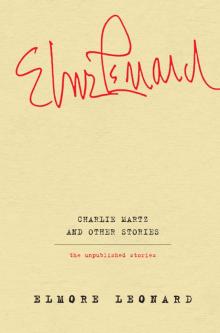 Charlie Martz and Other Stories: The Unpublished Stories
Charlie Martz and Other Stories: The Unpublished Stories Elmore Leonard's Western Roundup #2
Elmore Leonard's Western Roundup #2 Fire in the Hole
Fire in the Hole Tishomingo Blues (2002)
Tishomingo Blues (2002)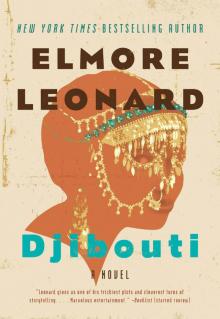 Djibouti
Djibouti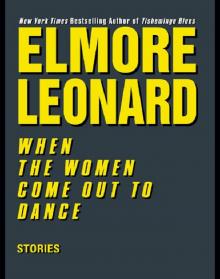 When the Women Come Out to Dance: Stories
When the Women Come Out to Dance: Stories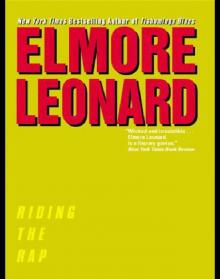 Riding the Rap
Riding the Rap Moment of Vengeance and Other Stories
Moment of Vengeance and Other Stories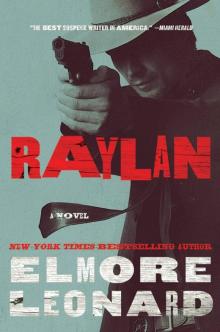 Raylan
Raylan Touch
Touch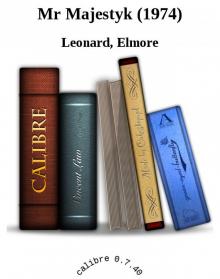 Mr Majestyk
Mr Majestyk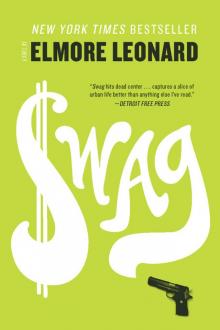 Swag
Swag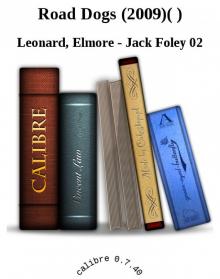 Road Dogs
Road Dogs La Brava
La Brava The Hot Kid
The Hot Kid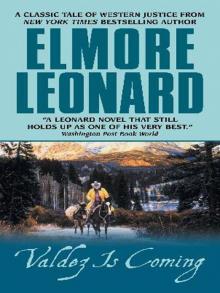 Valdez Is Coming: A Novel
Valdez Is Coming: A Novel Be Cool
Be Cool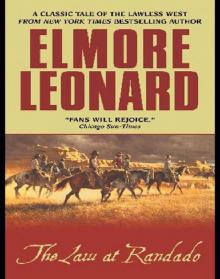 The Law at Randado
The Law at Randado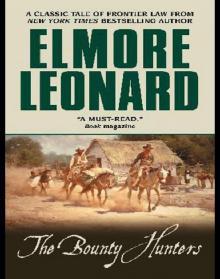 The Bounty Hunters
The Bounty Hunters When the Women Come Out to Dance
When the Women Come Out to Dance 310 to Yuma and Other Stories (1953)
310 to Yuma and Other Stories (1953)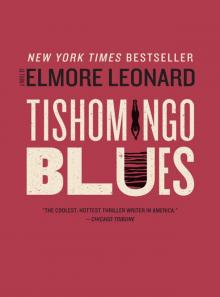 Tishomingo Blues
Tishomingo Blues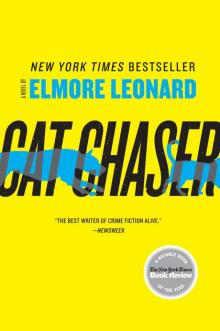 Cat Chaser
Cat Chaser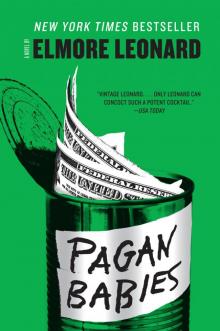 Pagan Babies
Pagan Babies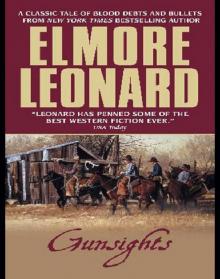 Elmore Leonard's Western Roundup #1
Elmore Leonard's Western Roundup #1 52 Pickup
52 Pickup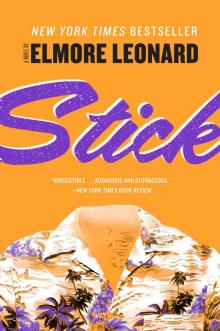 Stick
Stick The Moonshine War
The Moonshine War Valdez Is Coming
Valdez Is Coming City Primeval
City Primeval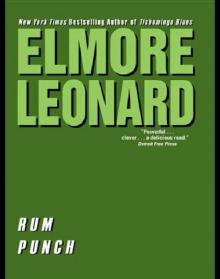 Rum Punch
Rum Punch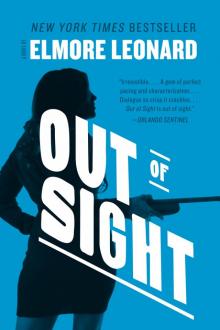 Out of Sight
Out of Sight Naked Came the Manatee (1996)
Naked Came the Manatee (1996)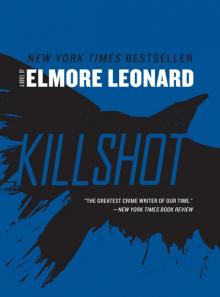 Killshot
Killshot Cuba Libre
Cuba Libre Forty Lashes Less One
Forty Lashes Less One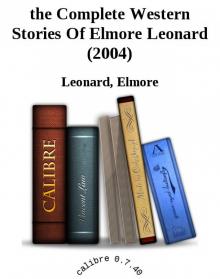 The Complete Western Stories of Elmore Leonard
The Complete Western Stories of Elmore Leonard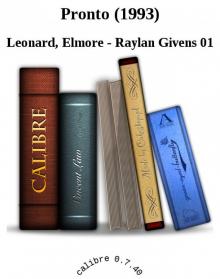 Pronto
Pronto Split Images
Split Images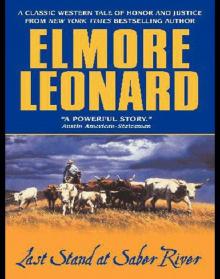 Last Stand at Saber River
Last Stand at Saber River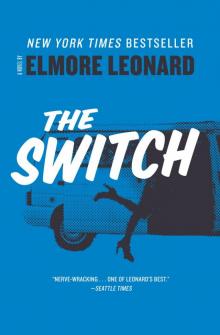 The Switch
The Switch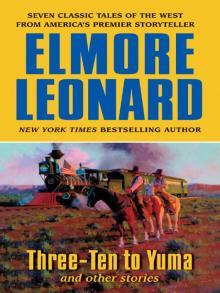 Three-Ten to Yuma and Other Stories
Three-Ten to Yuma and Other Stories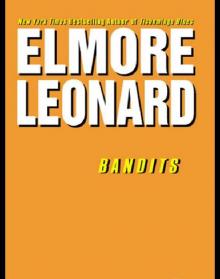 Bandits
Bandits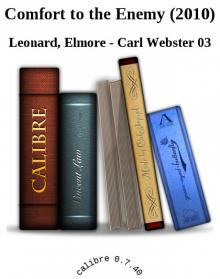 Comfort to the Enemy and Other Carl Webster Stories
Comfort to the Enemy and Other Carl Webster Stories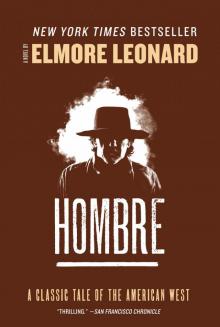 Hombre
Hombre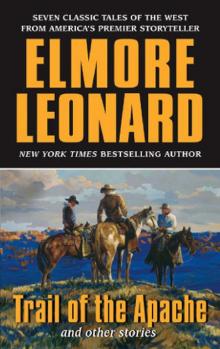 Trail of the Apache and Other Stories
Trail of the Apache and Other Stories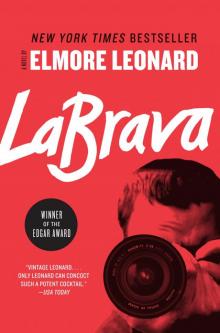 LaBrava
LaBrava Gold Coast
Gold Coast Jackie Brown
Jackie Brown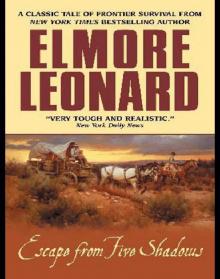 Escape From Five Shadows
Escape From Five Shadows Karen Makes out (1996)
Karen Makes out (1996)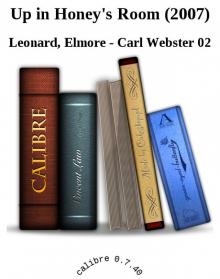 Up in Honey's Room
Up in Honey's Room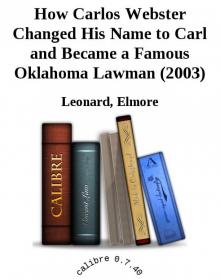 How Carlos Webster Changed His Name to Carl and Became a Famous Oklahoma Lawman (2003)
How Carlos Webster Changed His Name to Carl and Became a Famous Oklahoma Lawman (2003)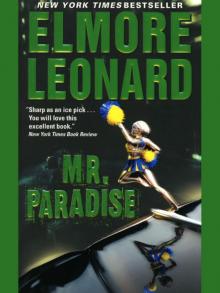 Mr. Paradise
Mr. Paradise The Hunted
The Hunted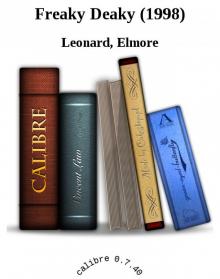 Freaky Deaky
Freaky Deaky Louly and Pretty Boy (Ss)
Louly and Pretty Boy (Ss)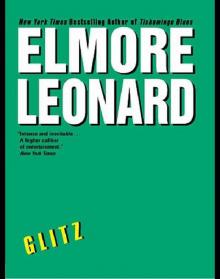 Glitz
Glitz A Coyote's in the House
A Coyote's in the House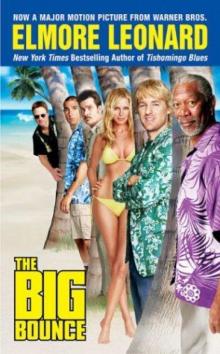 The Big Bounce jr-1
The Big Bounce jr-1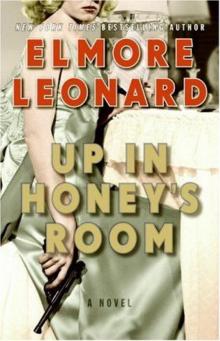 Up in Honey's Room cw-2
Up in Honey's Room cw-2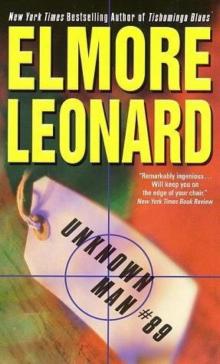 Unknown Man #89 jr-3
Unknown Man #89 jr-3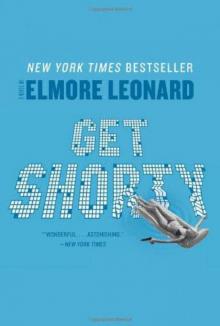 Get Shorty: A Novel cp-1
Get Shorty: A Novel cp-1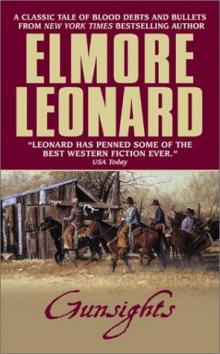 Gunsights
Gunsights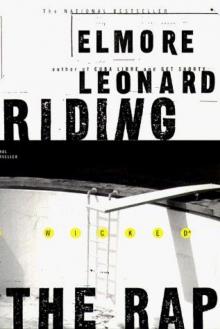 Riding the Rap rg-2
Riding the Rap rg-2